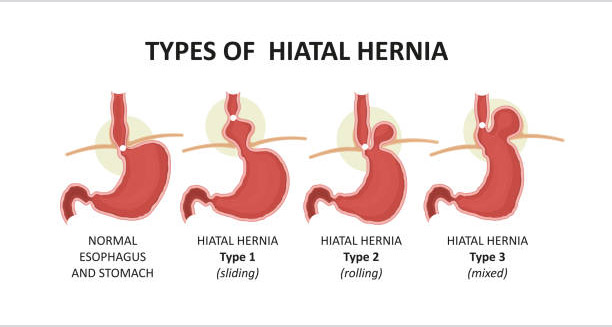A hiatus hernia occurs when part of the stomach pushes upward through the diaphragm into the chest cavity.
The diaphragm is a large, dome-shaped muscle that separates the chest from the belly and helps with breathing. The oesophagus normally goes through an opening in the diaphragm called the hiatus, then connects to the stomach. In this condition, the stomach slips up through the opening. This shift causes a problem in structure and may lead to issues like acid reflux.
Small hiatus hernias often cause no problems. But bigger ones can lead to serious discomfort and might need treatment or surgery. Learning more about what a hiatus hernia is, and knowing its causes, signs, tests, and treatments, helps people take control of their gut health.
Who Gets a Hiatus Hernia?
Hiatus hernias are more common than people think, especially in those over 50. Studies show that nearly 60% of people older than 60 might have one, even if they don’t feel any symptoms.
The most common kind is called a sliding hiatus hernia. In this type, the spot where the stomach and oesophagus meet slides into the chest. A rarer but more serious kind is the para-oesophageal hiatus hernia. Here, part of the stomach moves next to the oesophagus, not just above it. This type can be dangerous because it may block blood flow to that part of the stomach.
Many things can raise the risk of getting a hiatus hernia. Some common ones include being overweight, pregnancy, long-term coughing, or often lifting heavy things. These activities increase pressure in the belly and push the stomach upward.
As people get older, the muscles and tissues in their bodies grow weaker, including the diaphragm. This makes it easier for part of the stomach to slide through the hiatus. Family history can also play a part. Some people may be born with a larger opening or softer tissues, which makes them more likely to get this condition.
Symptoms of Hiatus Hernia
The signs of a hiatus hernia depend on how big it is and the type. Many people with small sliding types don’t feel anything at all. They often find out during tests done for other reasons.
But when symptoms do appear, the most common one is heartburn. This gets worse when lying down or bending forward. Other signs include acid coming back into the mouth, chest pain, a sour taste, or trouble swallowing. Some people burp a lot, feel sick, or feel full very quickly after eating.
These signs often happen because the muscle at the bottom of the oesophagus doesn’t work well. When that muscle weakens, stomach acid can flow back up. This is called acid reflux or gastroesophageal reflux disease (GERD).
In more serious cases like para-oesophageal hernias, symptoms may be stronger. These can include bad chest pain, constant vomiting, breathing trouble, or signs of bleeding such as black stools or blood in vomit. These signs might mean a part of the stomach has lost blood flow or twisted. If that happens, people must get help right away.
How Doctors Diagnose a Hiatus Hernia
To find out if someone has a hiatus hernia, doctors ask about their symptoms, check their body, and do special tests.
One common test is the barium swallow. The person drinks a chalky liquid, and doctors take X-rays to see if the stomach is out of place. Another test is an upper endoscopy, where a thin tube with a camera goes down the throat. This lets doctors see the inside of the oesophagus and stomach. They check for swelling, wounds, or signs of acid damage.
Doctors may also use manometry, which measures pressure in the oesophagus. This test shows how well the muscles and valves in that area are working. These tests help confirm the diagnosis and guide the treatment plan.
Treatment Options for Hiatus Hernia
Treatment depends on how bad the symptoms are. If someone has a small hiatus hernia and no signs, they might not need treatment right away. Still, doctors often suggest changes in habits and checkups now and then.
If there are symptoms like heartburn, doctors often give medicine and advise diet changes. Some common drugs are:
- Antacids to calm down acid
- H2 blockers like ranitidine or famotidine
- Proton pump inhibitors (PPIs) such as omeprazole or esomeprazole
These drugs help reduce acid and heal damaged tissue in the oesophagus.
At the same time, lifestyle changes matter a lot. People should eat smaller meals more often, avoid lying down right after eating, and stay away from spicy or fatty foods, chocolate, coffee, and alcohol. Raising the head of the bed also helps stop acid from rising during sleep.
Losing extra weight and quitting smoking are very helpful too. Both lower the pressure in the belly and make reflux less likely.
When Surgery Becomes Necessary
Sometimes, medicine and habits aren’t enough. If symptoms continue or if the person has a para-oesophageal hiatus hernia, doctors may suggest surgery.
The most common surgery is laparoscopic Nissen fundoplication. In this procedure, the surgeon wraps the top part of the stomach around the lower part of the oesophagus. This makes the valve between them stronger and stops acid from moving back up. At the same time, the surgeon moves the stomach back into place and tightens the diaphragm opening.
This surgery also helps people with para-oesophageal hernias avoid dangerous problems like strangulation. Most people recover well from surgery and feel better for many years after.
Living With a Hiatus Hernia
The outlook for people with a hiatus hernia is generally very good, especially if they catch it early and follow the treatment plan. The condition doesn’t usually threaten life, but it can cause a lot of discomfort if ignored.
By following a clear plan that includes medication, better habits, and sometimes surgery, most people feel much better and stay symptom-free. Still, some people may need regular checkups if their reflux returns.
Untreated acid reflux can lead to more serious problems like sores, scar tissue, or a change in the cells of the oesophagus called Barrett’s oesophagus, which raises cancer risk.
Final Thoughts on Hiatus Hernia
Hiatus hernia is a common problem, especially in older adults. While many people don’t even know they have it, those who feel symptoms need proper care.
A mix of good habits, the right medicine, and, if needed, surgery can give great relief and prevent future trouble. Early diagnosis and taking action early go a long way in keeping the digestive system healthy.


